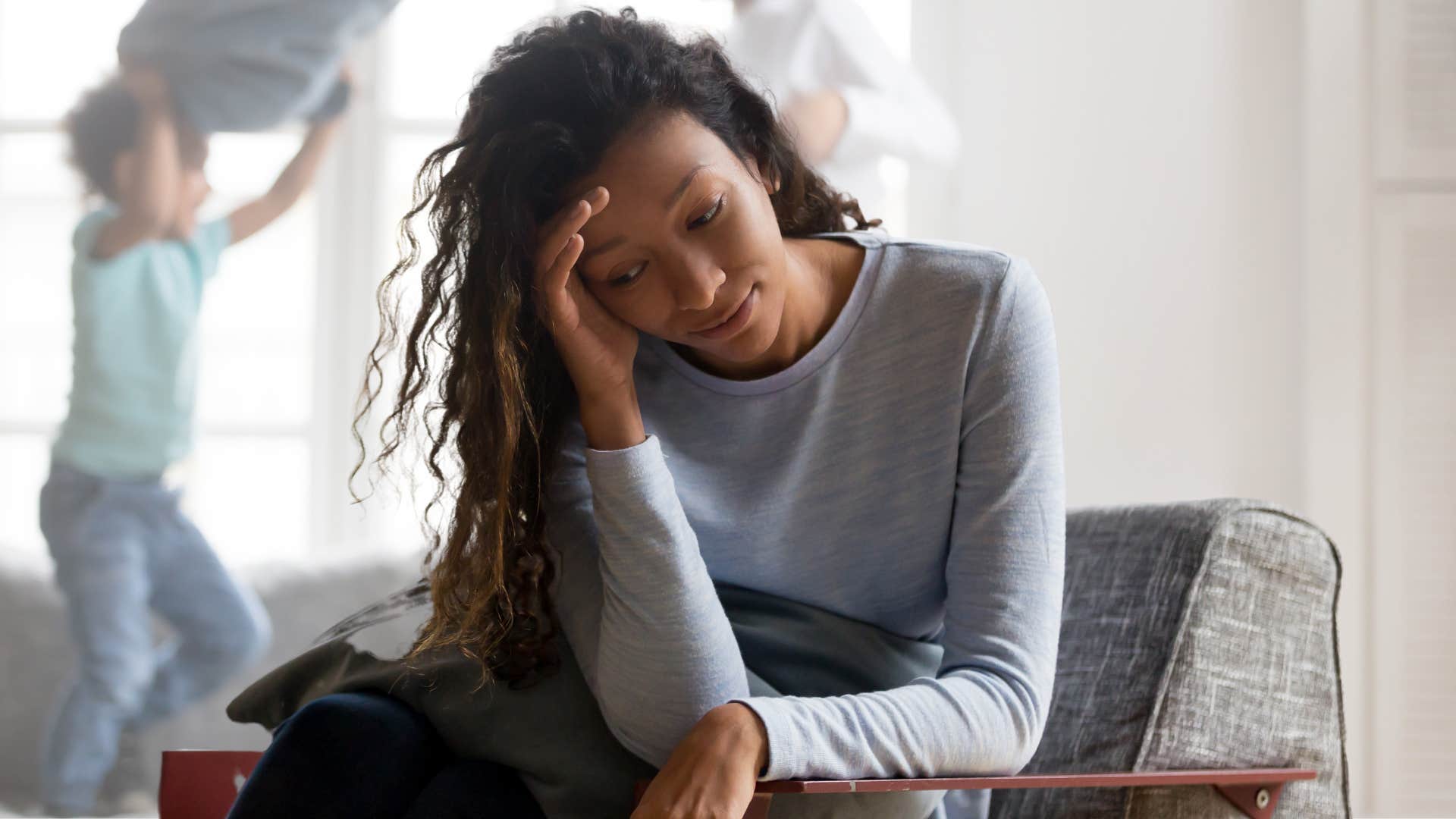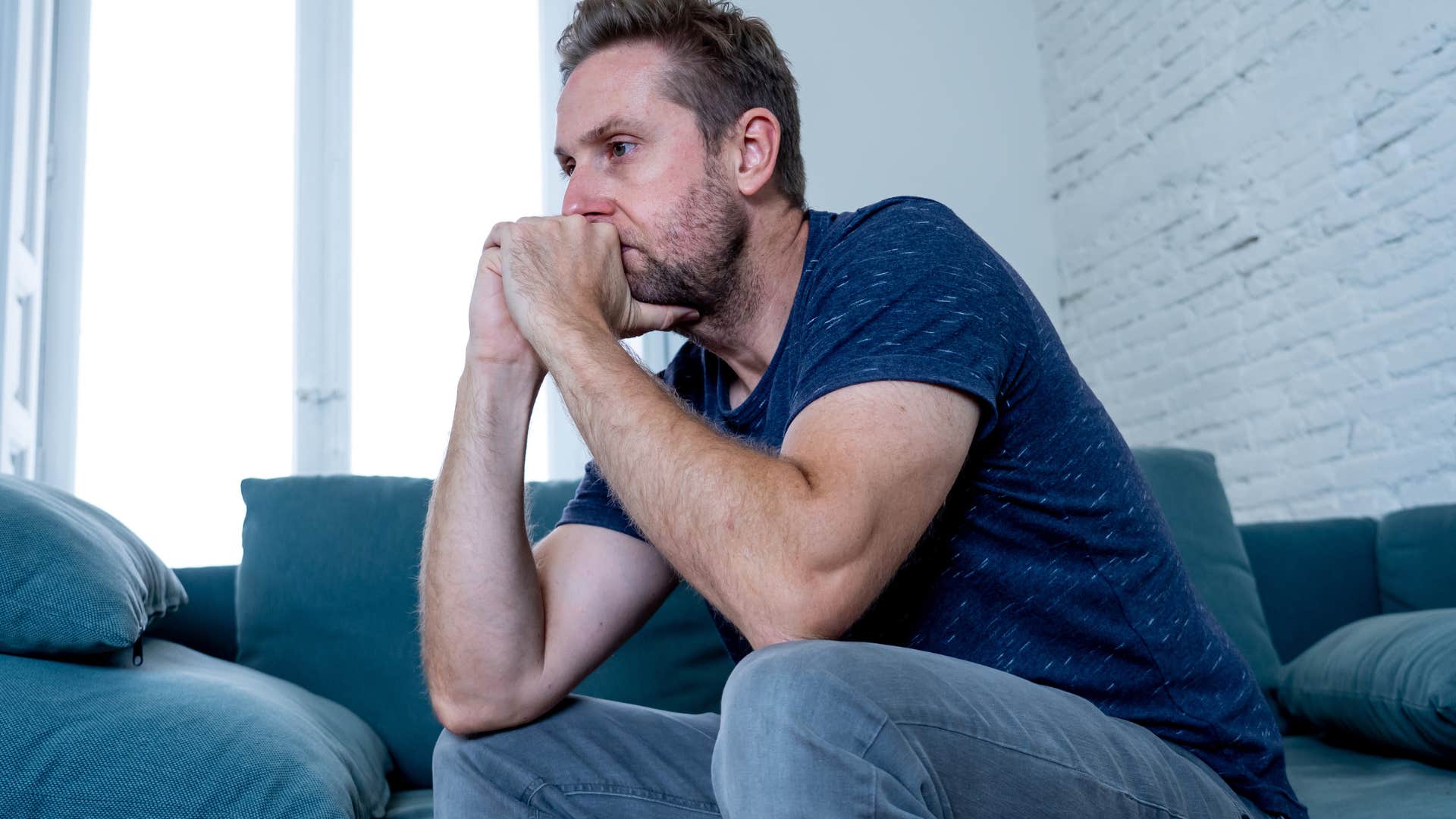10 Signs Someone In Your Life Is Experiencing Deep Emotional Pain, According To Psychology
How can you genuinely support your friends and peers if you never notice that they're struggling?
 Irene Miller | Shutterstock
Irene Miller | Shutterstock Many people struggling with depression, anxiety, and other mental health concerns view their emotional struggles as heavy burdens to the people in their lives. As such, they attempt to mask their behaviors and "suffer in silence," like experts from the University Health Partners of Hawaii explain, to avoid stressing out the people in their life and coming across as "a burden."
However, especially for people with close relationships, there are still signs someone in your life is experiencing deep emotional pain, which can help you acknowledge and address their emotional struggles. Even if you're the person struggling, remember that our healthy connections are so important and valuable for support — you're not burdening anyone by asking for help.
Here are 10 signs someone in your life is experiencing deep emotional pain, according to psychology
1. They're self-isolating
 Fizkes | Shutterstock.com
Fizkes | Shutterstock.com
Many people struggling with anxiety and depression self-isolate as a coping mechanism, according to a study from General Psychiatry, to deal with their uncomfortable feelings in private and avoid human interaction. While this might be a short-term fix to cope with their internal turmoil, it only contributes to a larger cycle of loneliness and isolation that negatively affects their health.
The anxiety, insecurities, and generally low self-esteem that people struggling emotionally often deal with can negatively affect relationships, as well as personal health, often manifesting as avoidant and anxious attachment styles that protect struggling people from having to express and explain uncomfortable emotions.
If you notice a friend or peer is over-prioritizing their alone time or canceling plans at the last minute, consider it as one of the subtle signs they're emotionally struggling and avoiding stressful interaction.
2. They're struggling to express their emotions
 Josep Suria | Shutterstock.com
Josep Suria | Shutterstock.com
According to clinical psychologist Matt Boland, emotional detachment isn't solely impactful for psychological well-being, it's also ingrained into our social experiences, physical well-being, and personal development. Many people struggling emotionally either never learned how to communicate and cope with their mental health concerns or feel too afraid to burden others by doing so.
While this isn't necessarily a measure of the health of their close relationships, it can be a sign that someone is struggling when they isolate themselves or divert attention away from conversations focused on vulnerability.
3. They resort to anger during arguments
 Fizkes | Shutterstock.com
Fizkes | Shutterstock.com
People who struggle with emotional regulation and coping mechanisms resort to anger or frustration when they're forced to express difficult emotions or involve themselves in conversations urging them to open up. Instead of expressing vulnerability with their close friends and partners, they turn inward, battling internal turmoil in ways that can come across as defensive and frustrating to peers.
Because anger is inherently a response to stress, according to orthopedic surgeon David Hanscom, MD, experiencing anxious feelings or emotional distress can spark this reaction in people without healthy coping or communication skills. For people who don't have the emotional capacity to deal with their own emotions or be presently cognizant of others, arguments and conflict can spark this kind of anger that's destructive to relationships.
4. They rely on unhealthy vices
 Kateryna Onyshchuk | Shutterstock.com
Kateryna Onyshchuk | Shutterstock.com
According to a study on loneliness in individuals with substance dependence, there's an intrinsic link between people experiencing loneliness and emotional distress and the tendency for them to adopt unhealthy vices. Trying to cope with their uncomfortable emotions, people struggle without healthy coping mechanisms like hobbies or asking for support, instead resorting to escapist habits like vices to ignore.
While they might not be actively engaging in these unhealthy vices with you, there are ways to notice the consequences of substance abuse in your daily life and interactions — from irritability, to anger, and actively self-isolating behaviors.
5. They're sleeping more than normal
 SeventyFour | Shutterstock.com
SeventyFour | Shutterstock.com
Oversleeping can be a sign of someone struggling with depression or other mental health concerns, according to the Cleveland Clinic, as it's a direct response to avoiding uncomfortable emotions and combating the physical fatigue associated with emotional burdens. Another study from Psychiatry Research also links isolation and feelings of loneliness to insomnia and a lack of quality sleep in adults.
So, while they may be sleeping more, there's signs someone in your life is experiencing deep emotional pain suggesting their quality of sleep is lacking. Many people avoiding their uncomfortable feelings also resort to overworking themselves, spending longer hours at the office or picking up extra projects, which can contribute to feelings of fatigue and burnout.
6. They're chronically tired and have low energy levels
 Fizkes | Shutterstock.com
Fizkes | Shutterstock.com
Fatigue is one of the most prevalent symptoms of depression, according to a study published in Innovations in Clinical Neuroscience, and can be one of the easier signs for friends and family of struggling people to notice.
Also contributing to a lack of focus, concentration and irritability, fatigue can take many forms, from physical symptoms like general aches, pains, and headaches, to more emotional and mental turmoil.
7. They have emotional outbursts
 Kmpzzz | Shutterstock.com
Kmpzzz | Shutterstock.com
While people emotionally struggling might self-isolate to avoid human interaction and feeling like a burden to the people in their lives, there comes a time when they're no longer able to avoid expressing their true emotions. Sometimes, that need comes out in casual conversations, but more often than not, it manifests in an intense emotional outburst.
Most commonly a response to conflict and repressed emotions, especially in people who never learned healthy emotional coping skills and regulation as a child, like psychiatrist Michael MacIntyre explains, these emotional outbursts can be clear signs that someone in your life needs some grace.
8. They're less interested in their favorite hobbies and activities
 SB Arts Media | Shutterstock.com
SB Arts Media | Shutterstock.com
While aging, grief, and burnout can cause people to be less interested in their favorite hobbies and activities, according to psychiatrist Michael Roman, depression is often the main perpetrator. Mentally fatigued by constant rumination and emotional turmoil, these people have little energy to invest in social connection, hobbies, and healthy coping mechanisms like exercise or journaling.
9. Their eating habits have drastically changed
 Prostock-studio | Shutterstock.com
Prostock-studio | Shutterstock.com
While weight gain or loss and changing eating habits are inherently sensitive, there's studies that suggest they can be signs someone in your life is experiencing deep emotional pain. A 2017 study argues that stress-induced cortisol hormones, which often contribute to weight gain, can increase in lonely people without social connection and healthy relationships.
In addition, people who lose weight or have significantly different eating habits may be using food as a means of control in their routines, considering they're struggling to cope and find that same control with their emotions and mental health.
10. They're neglecting their basic hygiene
 Dusan Petkovic | Shutterstock.com
Dusan Petkovic | Shutterstock.com
According to the National Alliance on Mental Health, poor personal hygiene is one of the most common, yet least discussed and acknowledged, symptoms of depression in people struggling with deep emotional pain. While it's typically severe depression and emotional distress that leads to noticeable changes in personal hygiene, people struggling typically have an indifferent to basic habits like brushing their teeth, making their bed, or combing their hair.
Already dealing with their emotional turmoil, planning and exerting enough energy to do basic tasks can feel equally impossible and overwhelming for these same individuals.
Zayda Slabbekoorn is a staff writer with a bachelor's degree in social relations & policy and gender studies who focuses on psychology, relationships, self-help, and human interest stories.

